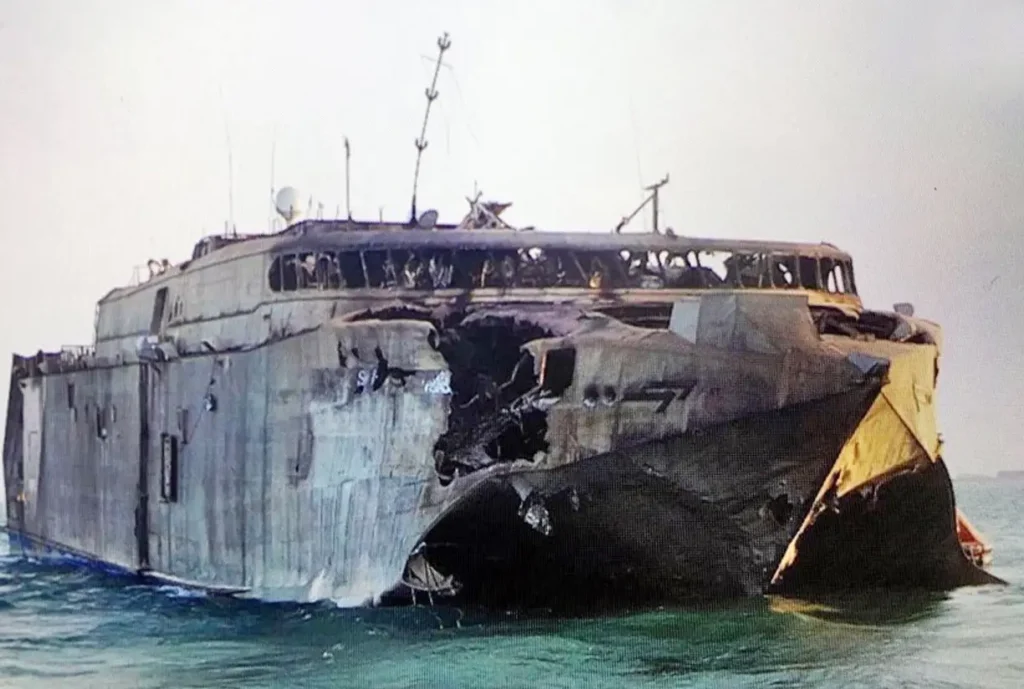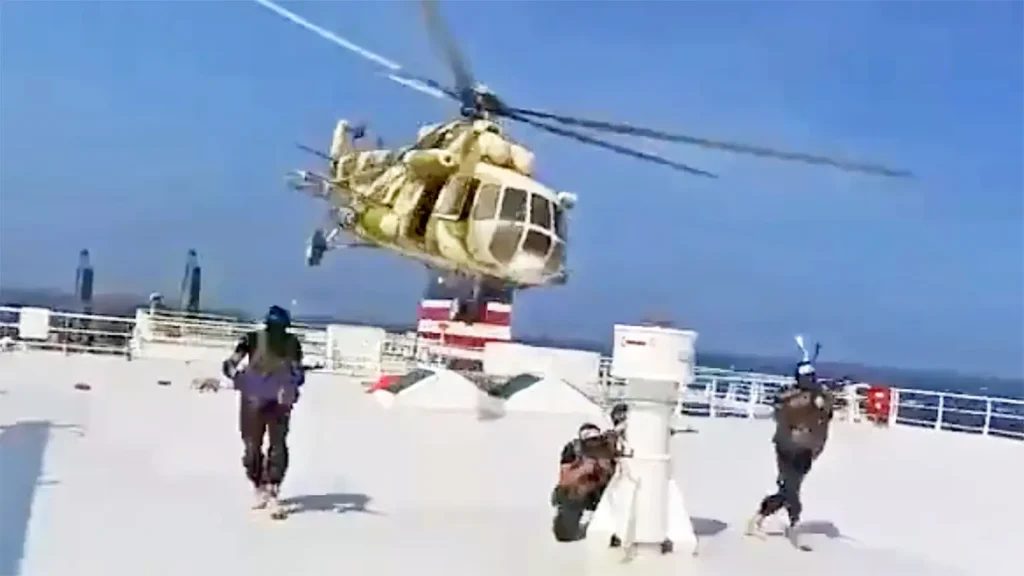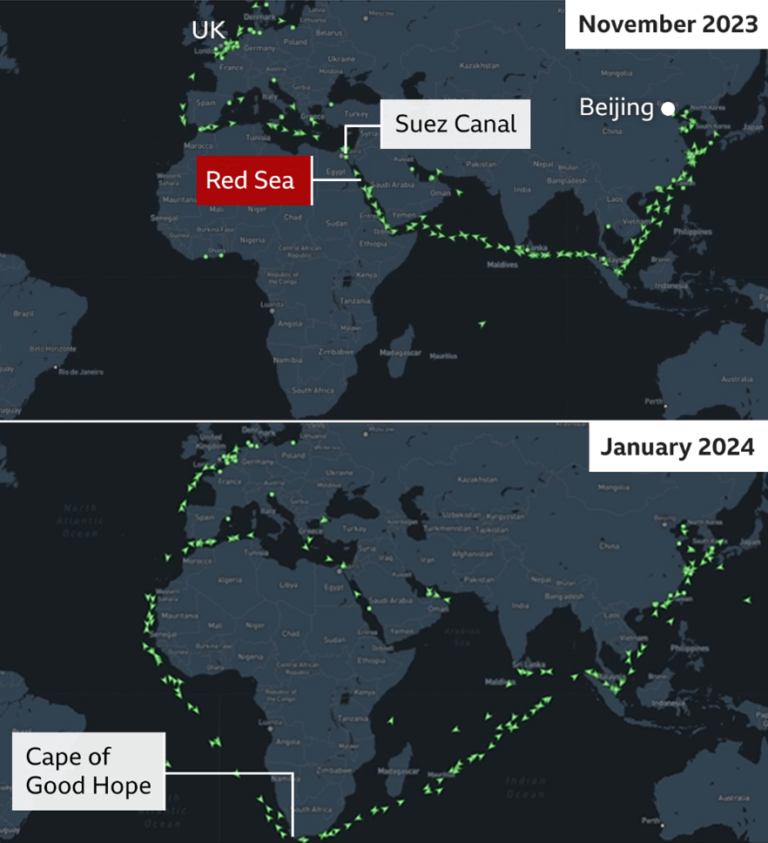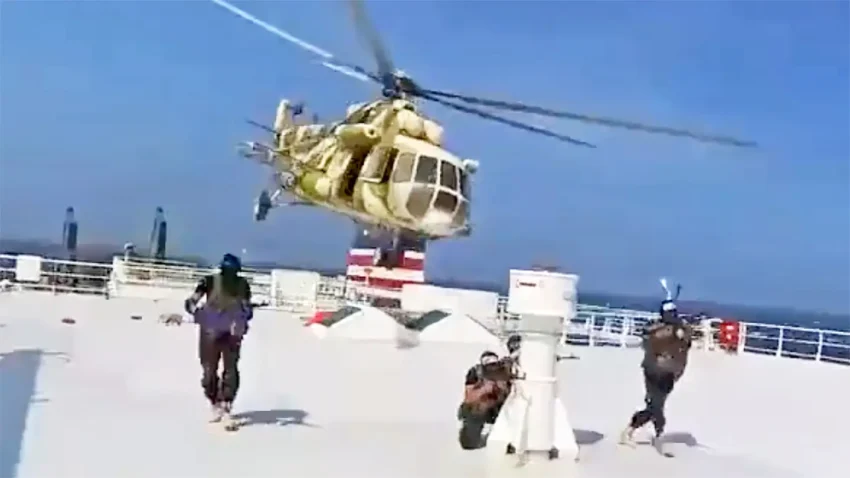What happened?
On January 11th at 02:30 (Sanaa time) or January 10th at 2330 (Belfast Time), British and American military assets, supported by allied nations, targeted more than sixty targets across sixteen sites (US Central Command). United States Naval F-18 Super Hornets launched from the USS Dwight D. Eisenhower and four Royal Air Force Typhoon fighters launched from RAF Akrotiri in Cyprus, some 1,500 miles (2,400 km) away and supported by an RAF Voyager refuelling tanker, struck Houthi targets including radar installations, air defence sites, logistics and drone launch sites and command and control node sites used by the militant organisation to launch attacks against civilian shipping.
Houthi forces claim five of its members were killed and six others injured.
RAF Typhoons Launch from RAF Akrotiri – (British Forces Broadcast Service)
USS Dwight Eisenhower launching EWACS and F-18 Super Hornets (US Central Command)
Why?
Over the last few months Houthi militant forces, operating out of Western Yemen and supported by Iran with training and resources (Kurt Volker, former US ambassador to NATO) have carried out a number of attacks including launching missiles toward Israel and American military forces and attacking and hijacking commercial shipping in the Red Sea. The shipping route is one of the most densely packed in the world and a major trade route for logistics connecting Europe with Asia and South Africa thanks to the Suez Canal. The 120-mile-long canal, which was built between 1859 and 1869, carries some 15% of global trade (UK Government, 2024) and saves millions in logistics costs as well as weeks in travel time.
The attacks not only make logistics more expensive impacting the economy, consumers and businesses but also put the safety of crews at risk and “endanger freedom of navigation in one of the world’s most vital waterways” (President Joe Biden, 2024).
In response to these attacks, the United States and Britain, supported by Australia, Bahrain, Canada and the Netherlands (President Joe Biden, 2024), launched military strikes against sites which included ammunition depots, radar installations being used to track and target shipping in the Red Sea, air defence systems and launch sites used for drone attacks against shipping and command and control nodes.
US National Security Council spokesperson John Kirby was asked by Channel Four’s Washington Correspondent Siobhan Kenndy about the risk of these strikes lead to an escalation of the conflict.
“No not at all”.
“In fact, the targets that we deliberately designed to degrade and disrupt Houthi capability to continue these reckless attacks in the red sea”.
“So, we’re going to do the assessment here today [Jan 4th, 2024] and in the coming hours we’re going to have a better sense of exactly what the impact of these strikes were”.
“But everything they were designed to do was to take the tensions down”.
Impact of the Houthi attacks?
While there haven’t yet been reported deaths from the Houthi attacks on shipping, if they continue it is only a matter of time before casualties do occur though there have been hijackings and hostage taking of commercial crews.
The British economy includes some £64 billion in imports from China and other local countries, and most of this arrives in containers onboard container ships but there has been a massive reduction in container shipping from half a million in November 2023 to some two hundred thousand currently (Kiel Institute for the World Economy). Additionally, the cost to ship these containers has rise from US$756 in November 2023 to over US$3,000 as of January 12th.
Who are the Houthi?
The Houthi are a Yemen based militia group founded in the 1990s. They formed in response to the Yemen President Ali Abudullah Saleh who the accused of being corrupt and having backed of the Saudia Arabia who classes them as a terrorist organisation and by the United States (Reuters, 2014).
As of 2020, its suggested that the Houthi movement had a strength of some two hundred thousand (UN Office for the Coordination of Humanitarian Affairs (OCHA), 2021) but that by 2024 that number was closer to twenty thousand (Guardian, 2024) and that they were becoming more advanced and capable in their attack capability. This has been achieved in a number of ways including the capacity of, mostly Soviet origin, military hardware from the Yemini Military including tanks, helicopters including Mi-17 transports and heavy weapons such as PK light machine guns and UB-32 rocket pods well as supply from third parties such as Iran. Houthi engineers have also modified weapons such as the old Society SA-2 air defence missile into a surface-to-surface missile and designed short range ballistic missiles based on old Soviet Scud missile systems (The Drive, 2022).
They’ve proven capable of striking both civilian shipping with cargo vessels being hijacked such as the Galaxy Leader, a cargo shipped jointly owned by an Israeli businessman (Reinsurance.ws, 2023) as well as targeting military vessels with the United Arabs Emirates logistics ship HSV-2 Swift, formerly of the United States Navy, being hit by Houthi anti-ship missile which left the vessel with catastrophic damage forcing her to be classed as unrepairable and decommissioned (The Drive, 2016).
Their attacks on shipping is claimed to be in support of Hamas having started shortly after the Israel-Hamas war with Houthi claiming they will attack any ship heading for Israel or with Israeli connections (BBC, 2024) however shipping not affiliated with Israeli have also been targeted including two Russian oil tankers (Ambrey, 2024).

HSV-2 Swift battle damage.

Galaxy Leader hijacking by Houthi militia.

Before and after comparison of container shipping (Source – BBC and Marine Traffic)
What the goal of the strikes?
In a jointed statement Rushi Sunak said that despite repeated warnings from the international community Houthi forces have continued their attacks “including against UK an US warships” and that in response to this“…we have therefore taken limited, necessary and proportionate action in self-defence, alongside the United States with non-operational support from the Netherlands, Canada and Bahrain against targets tied to these attacks, to degrade Houthi military capabilities and protect global shipping”. This was echoed by President Biden who said that he “will not hesitate to direct further measures to protect our people and the free flow of international commerce as necessary.”

